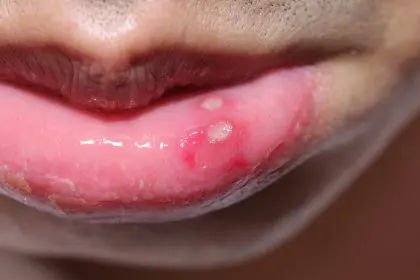The sudden appearance of a mouth lesion can raise concern, often leading to questions about its cause. While many may dismiss these small sores as harmless, recurring or persistent lesions may be an indication of underlying health conditions. Whether caused by something as simple as a food allergy or linked to more serious health problems, these lesions warrant attention. Identifying potential causes early could make a significant difference in health outcomes.
The importance of understanding mouth lesions
Mouth lesions are more than just annoying sores. They can be early warning signs of issues that range from mild irritations to severe health conditions. These small but often painful spots might be linked to stress, a vitamin deficiency or, in some cases, indicate a more serious medical condition. Paying attention to their frequency, location and appearance is vital.
For many, a mouth lesion may simply be a minor issue that resolves on its own. But for others, it can signal the onset of deeper health concerns. Understanding the various causes and symptoms associated with mouth lesions is essential to maintaining overall health and avoiding complications that may arise if left untreated.
Types of mouth lesions and their possible causes
Mouth lesions can take different forms, and each type may suggest something different about your health. Here are a few common types of lesions and what they may be pointing to:
1. Canker sores
Canker sores are small ulcers that appear inside the mouth — often on the inside of the cheeks, lips or tongue. They tend to be white or yellow with a red border. Though painful, they are usually harmless and clear up on their own. However, persistent or recurring canker sores could indicate an immune system issue or a deficiency in nutrients like vitamin B-12, folic acid or iron.
2. Cold sores
Cold sores — or fever blisters — are caused by the herpes simplex virus (HSV-1) and usually form on the lips — but they can also appear inside the mouth. These lesions are fluid-filled and can be triggered by stress, illness or sun exposure. If cold sores occur frequently, it could be a sign that your immune system is compromised or that you’re dealing with ongoing stress or hormonal changes.
3. Oral thrush
Oral thrush is a fungal infection caused by candida — a type of yeast. It presents as white patches on the tongue, inside of the cheeks or on the roof of the mouth. Individuals with weakened immune systems — such as those with diabetes or those undergoing chemotherapy — may be more susceptible. Oral thrush may also develop after taking antibiotics or inhaling corticosteroids.
4. Leukoplakia
Leukoplakia causes thick, white patches inside the mouth that can’t be scraped off. It’s often linked to tobacco use — either smoking or chewing — but can also be caused by poorly fitting dentures or long-term alcohol use. While leukoplakia itself is not cancer, some patches may have the potential to turn into oral cancer over time — making early detection crucial.
5. Lichen planus
Lichen planus is an inflammatory condition that can affect the skin or mucous membranes. In the mouth, it appears as white, lacy patches or open sores. The exact cause isn’t known, but it’s believed to be an autoimmune disorder. Managing the symptoms usually involves corticosteroids or other medications aimed at reducing inflammation.
Health conditions linked to mouth lesions
Though many mouth lesions are benign and resolve on their own, they can be a symptom of more serious health conditions. It’s important to understand when to seek medical advice.
1. Nutritional deficiencies
Lesions in the mouth may indicate a lack of essential nutrients. For instance, people with low levels of vitamin B-12, iron or folate may experience more frequent canker sores. In these cases, improving your diet or taking supplements may resolve the issue. However, if the deficiency is linked to a malabsorption disorder, further health care evaluation is necessary.
2. Gastrointestinal disorders
People with inflammatory bowel diseases (IBD) like Crohn’s disease or ulcerative colitis may experience mouth ulcers as part of their symptoms. These conditions cause widespread inflammation throughout the digestive tract, and mouth lesions may be one of the first signs.
3. Autoimmune disorders
Autoimmune conditions such as lupus, celiac disease and Behçet’s disease can manifest in the form of mouth lesions. These disorders occur when the immune system mistakenly attacks healthy cells — causing widespread inflammation and ulcers in the mouth.
4. Oral cancer
Mouth lesions that don’t heal after a couple of weeks should be taken seriously. Oral cancer can manifest as persistent sores, red or white patches or lumps in the mouth. Risk factors include smoking, heavy alcohol consumption and exposure to the human papillomavirus (HPV). Regular dental checkups and early detection significantly improve the chances of successful treatment.
5. HIV/AIDS
People with compromised immune systems — such as those living with HIV/AIDS — are more prone to mouth lesions. Conditions like oral thrush, herpes sores and other infections may occur more frequently or be harder to treat in these individuals.
Emotional impact of mouth lesions
It’s easy to overlook the emotional impact that mouth lesions can have, especially when they occur frequently or are associated with a chronic health condition. Mouth lesions can cause discomfort — make eating and speaking difficult — and lead to self-consciousness about appearance. The pain and inconvenience may also contribute to stress and anxiety, creating a cycle that can worsen symptoms.
If you experience recurring mouth lesions, it’s essential to recognize not only the physical symptoms but also the emotional toll they can take. Seeking support, whether through counseling, support groups or speaking with a health care provider, can be crucial to managing both the physical and mental aspects of living with mouth lesions.
When to seek medical advice
While most mouth lesions are harmless and go away on their own, certain symptoms warrant a visit to a health care professional. If you experience any of the following, it may be time to seek medical attention:
- Mouth lesions that last longer than two weeks
- Pain that doesn’t improve with over-the-counter remedies
- Lesions that are accompanied by fever, swelling or difficulty swallowing
- Recurring lesions that don’t seem to have an obvious cause
- Lesions that bleed or change in size, color or shape
Early detection and intervention can prevent potential complications, so it’s always best to err on the side of caution.
A small symptom with a big impact
Mouth lesions may seem like a minor issue at first glance, but they can be a signal something serious is happening beneath the surface. Paying attention to your body’s warning signs and seeking medical advice when necessary could be the key to catching and addressing a wide range of health conditions.
These small but significant sores are often our body’s way of communicating with us — making it essential to listen. Whether due to nutritional deficiencies, underlying autoimmune disorders or other health concerns, mouth lesions can provide valuable insight into your overall health. Don’t ignore them — your health and well-being depend on it.
By taking a proactive approach, you can manage your health more effectively and ensure that a seemingly small issue doesn’t lead to bigger problems down the road.
This story was created using AI technology.

















